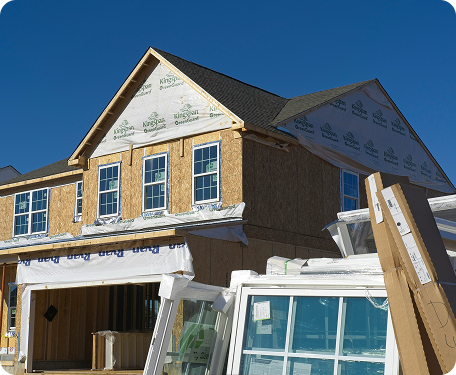Drywall Contractor Insurance: Installation & Finishing


Get tailored and hassle-free drywall contractor insurance with ContractorNerd


CONTRACTOR-SPECIALIST INSURANCE PROVIDERS








We cover what matters on the job.
Most insurance agents have no clue what drywall contractors actually deal with. We do. Drywall insurance is what we do, so we know the headaches, the risks, and what really matters on the job site.
Drywall Insurance, Remodeled
Drywall insurance is essential, but most carriers lump you in with general construction and miss the real risks of your trade. At ContractorNerd, we’ve built a proprietary quote platform specifically designed for drywall contractors like you.

Faster, Simpler, Better
As trades-only specialists focused on drywall, we’ve stripped away the complexity and built an insurance experience that’s faster, simpler, and actually understands your work.

Compare in one place
Our technology connects directly with insurers who get drywall operations, from hanging and taping to texture and finishing, while our specialized agents guide you through every step.

Solutions for Any Size
Whether you’re a one-man crew or running multiple finishing teams, our platform delivers exactly what you need without the delays or runaround of traditional insurance.
What Is Drywall Contractor Insurance?
ContractorNerd has done research to bring you a clear picture of insurance requirements and needs across the United States. Our analysis of over 200 drywall contractor insurance quotes across all 50 states provides unprecedented transparency on what coverage you need and current market rates.
Key Takeaways
- Drywall Insurance, Remodeled
- What Is Drywall Contractor Insurance?
- What Drywall Contractors Insurance Do You Need?
- Drywall Contractor General Liability Insurance Coverage
- How Much Does Drywall Contractor Insurance Cost?
- Drywall Contractor Workers Comp Insurance Requirements
- Insurance For Drywall Business That Expands Into Other Trades
- Additional Drywall Contractor Insurance Coverage Options
What Drywall Contractors Insurance Do You Need?
For drywall contractors, securing the right coverage is crucial and needs change based on the size and stage of your business. Here’s a guideline:
For Solo Drywall Contractors
1-3 Employees
For Small Drywall Businesses
5+ Employees
For Established Drywall Businesses
Essential Coverage
Drywall Contractor Liability Insurance (General Liability)
Your core protection against property damage and bodily injury claims. This is what GCs and homeowners mean when they ask if you’re insured.
Ongoing Operations
Covers damage while you’re hanging, taping, or finishing on-site
Completed Operations
Critical protection for issues discovered after you leave, like cracks from improper taping or moisture damage behind walls
Contractor License Bonds
Required in some states for your contractor license. Pro tip: Buy in 3-year increments when possible to avoid lapses and save money (typically costs a few hundred dollars).
Recommended Additional Coverage
Tools and Equipment Coverage (Inland Marine)
Protects your specialized drywall tools like automatic tapers, banjos, and power sanders
Contractor’s Errors & Omissions
Covers claims of faulty workmanship, materials, or finishing defects
Commercial Auto
Required if you have a dedicated work vehicle
Workers Compensation
Required when you hire employees (not needed for subcontractors)
Installation Floater
Protects expensive materials in transit or stored at job sites (drywall sheets, specialty compounds, fire-rated board)
Commercial Property
Covers your warehouse, storage areas, and offices
Umbrella Insurance
Extra liability protection as your crew size and project volume grow
Employment Practices Liability (EPLI)
Protection against employee-related lawsuits




































For Solo Drywall Contractors
Essential Coverage
Recommended Additional Coverage
For Small Drywall Businesses
2-3 Employees
All previous coverages, plus:
For Established Drywall Businesses
All previous coverages, plus:
Drywall Contractor General Liability Insurance Coverage
If there was a single coverage critical for all drywall contractors, this is it. General Liability Insurance provides essential protection for drywall contractors because your work involves many risks every day, from lifting heavy sheets and working on scaffolding to dust exposure and material damage in finished spaces.
Core protection includes

Bodily Injury
A client, visitor or bystander getting hurt from falling materials, tripping over equipment, or job site hazards.

Property
Damage
Accidental damage to a client’s floors, fixtures, cabinets, or existing finishes during hanging or finishing work.
Add-On

Completed
Work
Lawsuits over drywall issues from past completed jobs, such as cracking seams, moisture problems, or improper installation.
Liability Limits for Drywall Contractors
Typically, $1 million per occurrence and $2 million aggregate. Experts recommend a minimum of $1 million for adequate protection. Most commercial GCs require these limits just to get on a bid list, so carrying standard limits keeps more doors open.
Classification Codes
Drywall contractors typically use class code 92338, but some finishing specialists may use 91560
Key Factors Influencing Liability Quotes

Revenue
Higher revenue implies more work and higher risk, leading to increased quotes.

Policy Limits
Higher limits for specific projects or contracts may raise quotes.

Claims History
A history of frequent claims can result in higher quotes, similar to auto insurance.

Location
States with stricter regulations may have higher insurance quotes.

Services Offered
Different drywall services carry varying risks. Basic hanging is less risky than commercial fire-rated assemblies or specialty finishes, affecting your quote.
How Much Does Drywall Contractor Insurance Cost?
Quote Study Findings
Quotes generally amount to 0.6% to 8.7% of annual revenue. Our analysis of over 200 General Liability insurance quotes from leading carriers reveals significant variations across different states and business sizes.
We analyzed quotes based on these business profiles
Revenue
$150K
1 owner with ~10% subcontracting and 5+ years hanging and finishing without claims
Revenue
$500K
1 owner and 3 employees with ~10% subcontracting and 5+ years operating without claims
Revenue
$1M
1 owner and 5 employees with ~10% subcontracting and 5+ years operating without claims
We analyzed quotes based on these business profiles
Revenue Level
National Average
Favorable Rate
Potential Savings
Low % of Revenue
High % of Revenue
$150,000
$1,400
$570
59%
0.6%
1.2%
$500,000
$3,110
$1,290
59%
1.1%
2.8%
$1,000,000
$9,510
$3,790
60%
3.5%
8.7%
State-by-State Pricing Insights
To help drywall contractors better understand regional pricing variations, we’ve developed an in-depth resource examining drywall contractor insurance premiums in every state nationwide. This state-specific analysis reveals how local factors impact your actual costs and identifies opportunities for savings in your market. Explore our comprehensive guide to drywall contractor insurance cost by state for detailed premium breakdowns.

Drywall Contractor Workers Comp Insurance Requirements
Workers’ Compensation Insurance is essential for drywall contractors, providing coverage for employee injuries or illnesses related to work. The premiums are based on job risk, classified by the National Council on Compensation Insurance (NCCI) into class codes. Drywall contractors often fall under code 5445, with rates usually between $3.50 to $10 per $100 of employee payroll annually.
WC Policy Limits for Drywallers
These are often unlimited but can vary according to state regulations.
WC Rates for Drywallers
Between $3.50 and $10 per $100 of payroll.
Key Factors Influencing WC Premiums for Drywall Contractors

Class Codes
Group employees by job type and risk; higher risk means higher premiums. Drywall contractors commonly use code 5445 for wallboard installation or 5480 for plastering work.

State Regulations
States dictate workers’ compensation laws, influencing benefits and baseline rates. Geographic differences in living and healthcare costs also affect premiums.

Experience modifier
Reflects your safety record, starting at 1.0 and adjusting based on claims history. More incidents result in higher modifiers and premiums.

Payroll Size
Calculated as (payroll / $100) * rate * experience modifier, with larger payrolls leading to higher premiums
This insurance is typically mandatory if you have employees. It covers employee medical expenses, rehabilitation, lost wages, and even death benefits in case of job-related injuries or illnesses. For employers, it also provides legal coverage and compensation in case of employee lawsuits related to occupational injuries or illnesses.
Insurance For Drywall Business That Expands Into Other Trades
If you’re a drywall contractor who’s branched out into painting, framing, or insulation work, your standard drywall contractor insurance isn’t going to cut it. The work is different, the risks are different, and your coverage needs to reflect that.
Doing painting and finishing work? You need coverage that goes beyond hanging and taping. Overspray claims, surface prep damage, and specialty coating failures require painter insurance, not just drywall liability.
Taking on framing or carpentry? Drywall skills translate well to framing, but structural work carries different exposures. Load-bearing mistakes, improper bracing, and code violations need carpenter insurance. Your drywall policy won’t protect you when someone claims a wall wasn’t framed correctly.
Handling insulation installations? Make sure your policy covers the full scope of work. Fire-stopping failures, moisture barrier issues, and improper R-value claims require coverage that extends beyond just the drywall portion.
The bottom line: If you’re doing the work, you need the insurance. Don’t assume your drywall contractor policy covers these expanded services. A single uncovered claim from painting, framing, or insulation work can wipe out years of profit.
Talk to your insurance provider about adding trade-specific coverage, or you’re gambling every time you take on one of these jobs.

Insurance For Drywall Business That Expands Into Other Trades
Additional Drywall Contractor Insurance Coverage Options
As your drywall contracting business expands, these additional coverage types merit careful consideration beyond your core insurance portfolio:
Drywall Contractors License Bonds
These financial guarantees demonstrate your commitment to quality workmanship while satisfying state licensing boards. Bond requirements commonly range $5,000-$25,000, with annual premiums representing 1-3% of the bond amount. Your credit profile significantly influences pricing:
Quote Summary by Revenue Level
Bond Required
Top-Tier Credit
Standard Credit
Challenged Credit
$5,000
$100-$150
$150-$200
$200-$400
$10,000
$100-$300
$300-$500
$500-$1,000
$15,000
$150-$400
$400-$750
$750-$1,500
$20,000
$180-$500
$500-$1,000
$1,000-$2,000
$25,000
$200-$500
$500-$1,200
$1,200-$2,500
Regulations vary dramatically by state and locality. Check your specific state and municipal requirements, as some areas require contractor bonds while others have no blanket requirement.
Frequently Asked Questions
Do you need insurance to hang drywall?
Yeah, you’ll need general liability at minimum – most commercial jobs require $1M/$2M limits just to bid. Once you hire your first guy, workers’ comp is legally required in most states. If you’re solo, you can get by with GL and tools coverage, but bigger projects may require bonds too.
How much is drywall insurance?
General liability runs anywhere from $570 to $9,510 annually depending on revenue – that’s typically 0.6% to 8.7% of what you bring in. Workers’ comp hits harder at $3.50-$10 per $100 of payroll. A $150k revenue business usually pays around $3,110 for GL.
What insurance covers drywall repair?
Your general liability covers damage from drywall work – like if you punch through existing walls or materials fall and damage floors. Completed operations (usually an endorsement) protects you after the job’s done if drywall fails. Installation floater covers materials during install, and professional liability handles finishing work errors.
What insurance codes do drywall contractors use?
You’ll get classified under Code 92338 for commercial and residential remodel work. For workers’ comp, it’s Code 5445 for wallboard installation including metal studs, or Code 5480 if you do plastering and acoustic ceilings. Wrong classification means expensive audits, so get it right.













